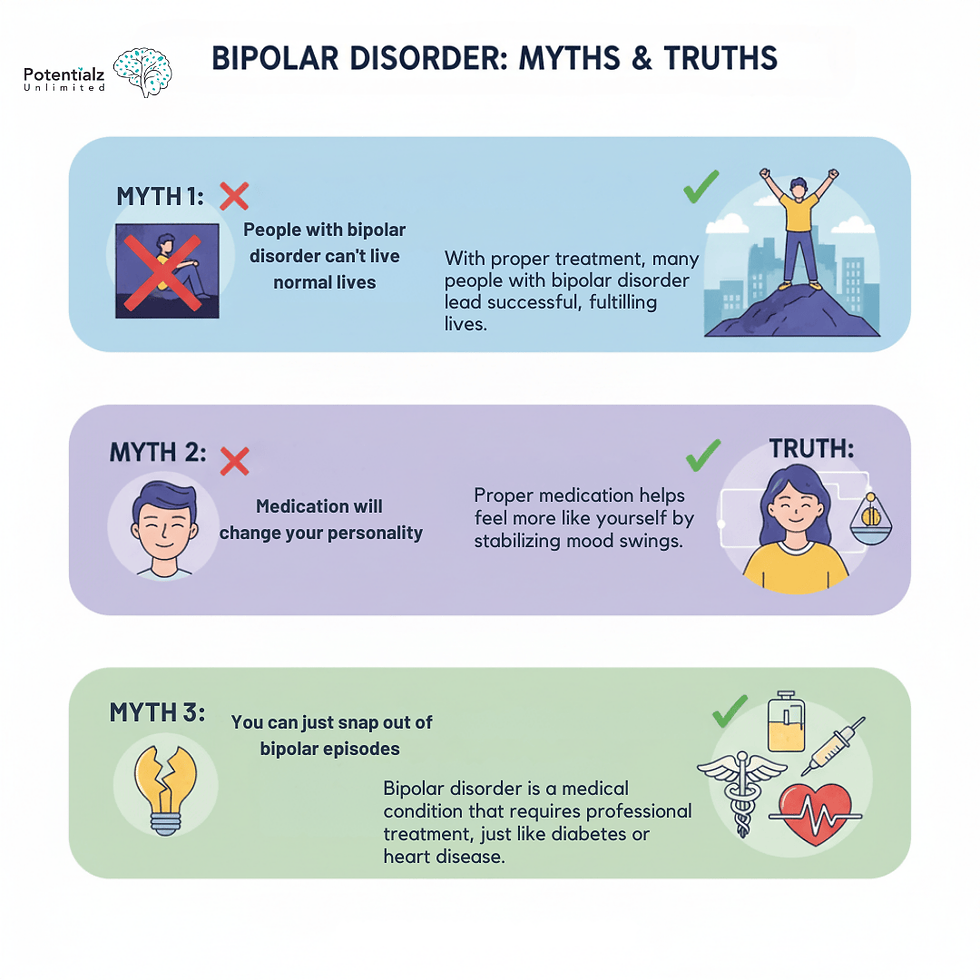Effective Treatment Options For Bipolar Disorder
- Gurprit Ganda

- Jun 12, 2024
- 8 min read
Updated: Sep 24, 2025

Have you ever felt like you're on an emotional rollercoaster that you can't get off? For people living with bipolar disorder, this feeling is very real. One day you might feel incredibly happy and full of energy, and the next, you could feel hopeless and exhausted. Understanding bipolar disorder and its effective treatment options is crucial for anyone affected by this condition.
What is Bipolar Disorder?
Bipolar disorders are chronic psychiatric conditions characterized by recurrent episodes of mania and depression. Affecting over 1% of the global population, these disorders contribute significantly to disability and mortality, often due to suicide and cardiovascular disease. Think of it like having a switch in your brain that gets stuck in different positions - sometimes "up" (mania), sometimes "down" (depression), and sometimes in the middle (stable).

Understanding the Two Faces of Bipolar Disorder
Manic Episodes: The "High" Phase
During manic episodes, people might experience:
Feeling extremely happy or "high"
Having lots of energy and needing very little sleep
Talking very fast and jumping between ideas quickly
Making risky decisions without thinking about consequences
Feeling like they can do anything
Depressive Episodes: The "Low" Phase
During depressive episodes, people might experience:
Feeling very sad, empty, or hopeless
Having no energy or motivation
Sleeping too much or having trouble sleeping
Losing interest in activities they usually enjoy
Having difficulty concentrating
The Latest and Most Effective Treatment Options
Medication: The Foundation of Treatment
Lithium: The Gold Standard Lithium has been reported to reduce the risk of life-threatening suicide attempts and death by 60–80%. Several systematic reviews and meta-analyses have concluded that maintenance lithium treatment significantly reduces the rates of suicide and suicide attempts in patients diagnosed with bipolar disorder. Despite being discovered over 70 years ago, lithium remains the most effective treatment for bipolar disorder.

How Lithium Works:
Helps stabilize mood swings
Prevents both manic and depressive episodes
Has unique anti-suicide properties
Works best when blood levels are carefully monitored
Newer Medication Options: Current pharmacotherapies, many of which were serendipitously discovered, sufficiently target aberrant neurotransmission but yield inadequate outcomes and cause burdensome side effects. Alternative treatments with fewer adverse effects are in development.
Modern treatments include:
Atypical Antipsychotics: Like olanzapine and quetiapine
Anticonvulsants: Such as valproic acid and lamotrigine
Combination Therapies: Using multiple medications together for better results
Breakthrough New Treatments
Accelerated Theta Burst Stimulation (aiTBS)
A potential new treatment for bipolar disorder (BP) that significantly shortens treatment time has emerged, following a randomized clinical trial using accelerated intermittent theta burst stimulation (aiTBS). While current theta burst stimulation (TBS) treatments can take between four and six weeks to administer, this new technique reduces treatment to five days.
This exciting new treatment:
Uses magnetic fields to stimulate the brain
Takes only 5 days instead of 4-6 weeks
Is non-invasive and doesn't require surgery
Shows promising results for depression in bipolar disorder

Ketamine and Innovative Approaches
New treatments, such as repetitive transcranial magnetic stimulation (rTMS) and intranasal ketamine, show promise, with rTMS demonstrating high response and remission rates, and ketamine potentially offering rapid antidepressant effects.
Therapy: The Power of Talking and Learning
Cognitive Behavioral Therapy (CBT)
CBT helps people with bipolar disorder by:
Teaching them to recognize early warning signs of mood episodes
Developing healthy coping strategies
Challenging negative thought patterns
Learning problem-solving skills
Interpersonal and Social Rhythm Therapy (IPSRT)
This specialized therapy focuses on:
Establishing regular daily routines
Improving relationships
Managing life changes that might trigger episodes
Stabilizing sleep and wake cycles

Family Therapy
Family therapy is essential because:
It educates family members about bipolar disorder
Helps families communicate better
Teaches everyone how to support recovery
Reduces stress in the home environment
The Importance of Personalized Treatment
Less than half of people with bipolar disorder describe themselves as having found effective treatments, meaning they've had a partial treatment response or intolerable side effects from medications. This is why researchers are now focusing on personalized medicine approaches.
Cognitive Subtypes in Bipolar Disorder:
Using statistical techniques, researchers identified three subtypes of bipolar disorder:
"Cognitively intact" (about 30% of people with bipolar disorder): Performed similarly to healthy controls and even outperformed them on at least one measure of social cognition. "Selectively impaired/suboptimal" (about 30%): Showed mild to moderate impairment on processing speed, attention, and social cognition, but performed average or above average on other measures.
Self-Care: Your Daily Toolkit for Success
Lifestyle Management
Regular Sleep Schedule: Going to bed and waking up at the same time every day
Exercise: Regular physical activity helps stabilize mood
Healthy Eating: A balanced diet supports brain health
Stress Management: Learning relaxation techniques
Mood Tracking
Keeping track of your moods helps you:
Identify triggers for mood episodes
Notice early warning signs
See patterns in your emotions
Share important information with your treatment team

Identifying and Managing Triggers
Common triggers for bipolar episodes include:
Stress: Major life changes, school pressure, or relationship problems
Sleep Disruption: Staying up too late or irregular sleep patterns
Substance Use: Alcohol or drugs can trigger episodes
Medication Changes: Stopping or changing medications without medical supervision
Early Warning Signs to Watch For
Mania Warning Signs:
Needing less sleep than usual
Talking faster than normal
Having racing thoughts
Feeling unusually confident or energetic
Depression Warning Signs:
Feeling sad or empty for several days
Losing interest in favorite activities
Having trouble concentrating
Changes in appetite or sleep
The Critical Role of Professional Support
Building Your Treatment Team
A complete treatment team might include:
Psychiatrist: For medication management
Psychologist: For therapy and counseling
Social Worker: For practical support and resources
General Practitioner: For overall health monitoring
Finding the Right Professional
When looking for a mental health professional, consider:
Their experience with bipolar disorder
Whether they make you feel comfortable and understood
If they explain things in ways you can understand
Whether they involve your family when appropriate

Breaking Myths and Reducing Stigma
Myth 1: "People with bipolar disorder can't live normal lives"
Truth: With proper treatment, many people with bipolar disorder lead successful, fulfilling lives.
Myth 2: "Medication will change your personality"
Truth: Proper medication helps you feel more like yourself by stabilizing mood swings.
Myth 3: "You can just 'snap out of' bipolar episodes"
Truth: Bipolar disorder is a medical condition that requires professional treatment, just like diabetes or heart disease.

Special Considerations for Young People
School and Academic Support
Students with bipolar disorder may benefit from:
Extended time for tests and assignments
Flexible attendance policies during treatment
Regular communication between school and healthcare providers
Peer support groups
Social Relationships
Maintaining friendships while managing bipolar disorder involves:
Being honest with close friends about your condition
Setting boundaries when you need space
Learning to recognize when you need extra support
Building a support network of understanding people
Hope for the Future: Emerging Research
Emerging research underscores the potential of precision psychiatry and digital health tools to enhance diagnosis and treatment. The future of bipolar disorder treatment is bright, with researchers working on:
Digital Health Tools: Apps and devices that can monitor mood and predict episodes
Precision Medicine: Treatments tailored to individual genetic profiles
New Medications: Drugs that work faster and have fewer side effects
Brain Stimulation Techniques: Advanced methods like the aiTBS mentioned earlier

Living Well with Bipolar Disorder
Remember, having bipolar disorder doesn't define who you are. It's just one aspect of your health that can be managed with the right tools and support. Many successful people throughout history have lived with bipolar disorder, including artists, scientists, politicians, and everyday heroes.
Keys to Success:
Stay Connected: Maintain relationships with supportive family and friends
Follow Your Treatment Plan: Take medications as prescribed and attend therapy sessions
Practice Self-Care: Prioritize sleep, exercise, and stress management
Stay Informed: Learn about your condition and new treatment options
Advocate for Yourself: Speak up about your needs and concerns
When to Seek Emergency Help
Contact emergency services immediately if you or someone you know:
Has thoughts of suicide or self-harm
Shows signs of psychosis (hearing or seeing things that aren't there)
Engages in extremely risky or dangerous behavior
Shows severe depression with inability to function
Crisis Resources:
National Suicide Prevention Lifeline: 988 (US)
Crisis Text Line: Text HOME to 741741
Emergency Services: 000 (Australia)
Conclusion: Treatment Options for Bipolar Disorder
Living with bipolar disorder can feel overwhelming at times, but remember that you're not alone in this journey. With the right combination of medication, therapy, lifestyle changes, and support from loved ones, it's entirely possible to lead a happy, successful life.
The field of mental health is constantly advancing, bringing new hope and better treatments for people with bipolar disorder. The burden has continued to grow since 1990 with no evidence of reduction, but research highlights new treatments that show promise.
By staying informed about the latest treatment options and working closely with your healthcare team, you can take control of your mental health and build the life you want.
At Potentialz Unlimited, we understand the challenges of living with bipolar disorder, and we're here to help you navigate this journey. Our experienced team of mental health professionals specializes in evidence-based treatments for bipolar disorder, including the latest therapeutic approaches and personalized care plans.
Remember, seeking help is a sign of strength, not weakness. Your mental health matters, and with the right support and treatment, you can thrive despite the challenges of bipolar disorder.
Test Your Knowledge
Related Articles on Potentialz.com.au
References (APA 7 Style):
Anmella, G., De Prisco, M., Joyce, J. B., et al. (2024). Automated speech analysis in bipolar disorder: The CALIBER study protocol and preliminary results. Journal of Clinical Medicine, 13, 4997.
Burdick, K. E. (2024, August 28). Neurocognitively defined subtypes in bipolar disorder: A path to more personalized treatments. Psychiatric News, 59(09).
Fraiha-Pegado, S. (2024). Trace lithium levels in drinking water and dementia: A systematic review. International Journal of Bipolar Disorders.
Kessing, L. V., et al. (2024). Why is lithium [not] the drug of choice for bipolar disorder? A controversy between science and clinical practice. International Journal of Bipolar Disorders, 12, 362-7.
Sheline, Y. I., et al. (2024). New form of repetitive magnetic brain stimulation reduces treatment time for bipolar disorder. JAMA Psychiatry.
Strawbridge, R., et al. (2023). Current and emerging therapies for bipolar disorder. US Pharmacist, 49(5), 22-34.
Yildiz, A., et al. (2024). Bipolar disorders: An update on critical aspects. The Lancet Regional Health – Europe.














Comments